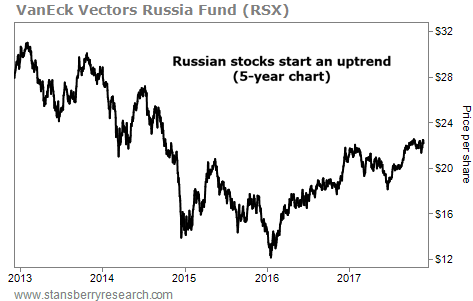| Home | About Us | Resources | Archive | Free Reports | Market Window |
These Four Secrets Can Change Your Investing FortunesBy
Wednesday, November 29, 2017
To bake a cake, you need the right ingredients.
If you don't have good flour, the right kind of sugar, and fresh eggs, you might still get lucky and bake something tasty. But chances are, without these critical ingredients, your cake won't taste like cake.
It's the same thing when it comes to analyzing investments – whether it's real estate, stocks, funds, or cryptocurrencies. Bad ingredients lead to a bad result.
So today, I want to tell you about four key secrets... the "good cake" ingredients of a good investment...
What's the first thing you do when your kid comes running up to you, telling you that your other kid just hit him? You ask for context. What happened? Who hit first? Why? When? You don't take anything at face value. It's the same with investing: Context matters. Who are you buying from? Why is he selling? If the investment is cheap, or expensive, what's the reason? And why do you think you know something that the seller doesn't? (If it was such a great investment, he wouldn't be selling it, would he?)
Answering these kinds of questions isn't easy. You can do it on your own. But if you lack experience, it's like researching your cold symptoms on the Internet... You'll likely end up misdiagnosing the problem, or self-medicating with snake oil.
The best solution is to seek out someone who's done it all before. Experienced investors know what to look for... They know what works and what doesn't. So if you're new to real estate, it helps to talk to someone who's been doing it for a long time. Or if you're curious about cryptocurrencies, you can follow the insight of someone with real-life experience in that world – and the know-how to separate the good from the bad.
In any case, context is critical – and experience helps you figure it out.
Whenever you buy one thing, you're making a decision to not buy many other things. In other words, your decision comes with an "opportunity cost." When you're investing in stocks, the opportunity cost is easy to work out – after the fact. You can see how other stock prices changed, and (if you want to torture yourself) you can look at how much money you might have made on a different choice.
But the "cost" of what you didn't buy also applies to other types of goods. The money you spend on that long weekend at the beach is cash that you're not putting away for your children's education. You're also not buying a stock that could double or triple next year (or a stock that could fall to zero).
Part of assessing an investment is looking at what you could be buying instead... so you can make the right choice.
If your objective is to make money – and if you're reading this, I'm guessing it is – then the price you pay, more than anything else, will determine whether or not you wind up making or losing money. A great company can still be a lousy investment if its shares are expensive. And a terrible company – if its stock is cheap, and things are beginning to improve – might be a fantastic investment.
To know what's cheap or expensive, you need to look at valuation. One of the best ways to measure value in stock markets is to use the cyclically adjusted price-to-earnings (or CAPE) ratio, which smoothes out short-term price fluctuations.
Investing in markets that have a low CAPE ratio, on average, results in much better returns than buying markets with high CAPE ratios. Of course, this is the same for individual stocks... All else being equal, your odds of making money improve when you buy stocks cheap.
Anything can happen to prices in the short term. More people rushing to buy an overvalued "hot" stock will push the price up higher... And negative sentiment toward an out-of-favor stock can mean that it takes a while for a cheap asset to rise in price. But in the end, value will prevail.
You can't fully understand the context (see point No. 1), determine if something is cheap or not (see point No. 3), or know your other options (see point No. 2) if you don't do the work to figure it out. The alternative is to get someone both knowledgeable and trustworthy to help you. For some people, that's a financial adviser. But I believe that with time, energy, and focus, everyone can master their own financial universe.
In short, you can get away with being lucky... for a while. But eventually, the odds catch up with you.
Understand the context... assess the opportunity cost... and buy on the cheap... all after doing the required due diligence. That's what goes into a great investment.
Good investing,
Kim Iskyan
Further Reading:
As Kim explains, investors need context and experience to be able to spot great opportunities. Today, a simple bias is turning financial luminaries against cryptocurrencies like bitcoin... But those who understand these assets could make a fortune. Read more here.
Dave Eifrig recently shared another key ingredient to choosing great investments – with the strength of your whole portfolio in mind. This specific kind of diversification could save you in a crisis... Learn more here.
Market NotesWATCH THIS COUNTRY'S STOCKS AS THINGS GET 'LESS BAD' Today's chart highlights a beaten-down market that's starting to climb...
Regular readers know Steve coined the term "bad-to-less-bad trading" several years ago. If you buy assets dirt-cheap when no one is left to sell, you can make massive profits as the market returns to normal – that is, when things simply get "less bad." Right now, we can see this at work in Russian stocks...
The VanEck Vectors Russia Fund (RSX) holds some of the country's biggest companies. It tracks a basket of 31 stocks, with its largest holdings in the energy, materials, and financials sectors... And it's one of the easiest ways for Americans to invest in Russia. From its 2013 peak to its 2016 low, RSX plunged more than 60%. But then oil prices bottomed, Russian energy stocks stopped falling, and things got "less bad"...
Since then, RSX has exploded into an uptrend. Shares are up nearly 85% from last year's lows, and they're trading close to 52-week highs. Pay attention – this could be the start of the next rally in Russian stocks...
 |
Recent Articles
|



